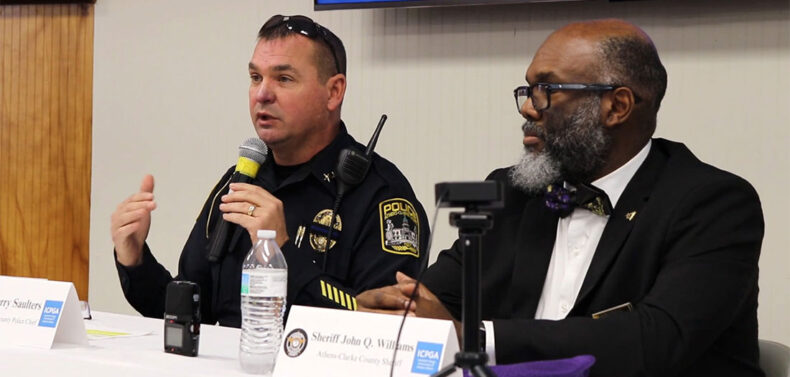As far as local law enforcement officials know, Immigration and Customs Enforcement has not been conducting large-scale roundups in Athens, and police are not participating in the Trump administration’s crackdown on undocumented immigrants except as required by law.
The Interfaith Clergy Partnership of Greater Athens held a special meeting on Tuesday, Feb. 11 at Ebenezer Baptist Church West to better understand how new federal and state immigration laws may affect their congregations and the Athens community as a whole. Athens-Clarke County Police Chief Jerry Saulters and Sheriff John Q. Williams took questions for about an hour on local law enforcement procedure and how it has changed recently due to new laws like the national Laken Riley Act (S.5) and the Georgia Criminal Alien Track and Report Act of 2024 (HB 1105).
As a local law enforcement agency, ACCPD is not responsible for enforcing federal immigration laws and has generally not cooperated with U.S. Immigration and Customs Enforcement (ICE) in the past. Similarly, the Clarke County Sheriff’s Office stopped honoring ICE detainers in 2018 when it became clear that holding inmates beyond their release date was a potential violation of 4th Amendment rights.
ICE often asks sheriffs to detain undocumented immigrants in jail for up to 48 hours after they would normally be released. ICE makes these requests to give their agents time to travel to the jail in question so they can take the immigrant into federal custody, although they often fail to show up due to a lack of available agents. These requests are entirely voluntary in most states and can even be illegal to comply with in some cases if the detainment request is not authorized by a judge.
When he became sheriff in 2021, Williams continued the non-cooperation policy of his predecessor, Ira Edwards. “Last I checked, the Constitution applies. It’s the law of the land, not the law of where you were born,” Williams told clergy members. “If you’re here in America, I’m going to treat you like an American.”
However, Gov. Brian Kemp and the Georgia legislature took discretion away from local sheriffs on immigration matters last year with HB 1105. The Georgia Criminal Alien Track and Report Act of 2024 requires sheriffs to verify the immigration status of those taken into custody, and to report to ICE and the U.S. Department of Homeland Security. It also requires that sheriffs comply with ICE detainer requests and treat these documents as if they were actual warrants issued by a judge.
“If someone commits a crime and they are brought to jail, there are certain queries we [now] have to run,” Williams said. “We don’t have any type of discretion. There is no question about constitutionality. The law says that if ICE issues a detainer, that’s the same thing that would have been a warrant in the past.”
While Williams is sworn to uphold these new laws, he doesn’t fully agree with them. He emphasized in his comments that his office remains focused on serving the needs of the entire community, not on doing the work of federal immigration police.
“We don’t work for ICE except to the extent that we have to follow the law and cooperate with them on certain things… We are not federal agents, that’s not what our focus is. It’s about the community,” Williams said. “Anywhere we can err on the side of humanity, that’s what we do. If we do have that discretion, that’s what we do.”
Similarly, Saulters told clergy members that the ACC Police Department focuses on protecting and serving the community, and that they do not perform immigration raids. “Unless you’ve committed a crime or there’s probable cause, we’re not checking people’s [immigration] status as a police department,” Saulters said.
Still, he said that HB 1105 has changed the way the police department operates. ACCPD is now forced to gather information on undocumented immigrants and to take them into custody when they commit a crime, including even some minor offenses, or when the police officer believes they have probable cause that a crime has been committed. Today, something as minor as shoplifting or driving without a license could cause someone to be deported.
“The way it was with the police department before is, we didn’t check someone’s [immigration] status,” Saulters said. “But what happened is with [HB 1105], it has placed additional responsibilities on law enforcement officers regarding the identification and fingerprinting of persons where probable cause exists to believe they have committed a crime… including traffic offenses.”
Traffic offenses are particularly relevant to undocumented immigrants because these community members are not allowed to apply for a driver’s license in Georgia. Currently, if an ACC police officer pulls someone over for a traffic offense and finds that they are driving without a license, the officer must attempt to verify the driver’s immigration status. If the driver is undocumented, the officer must inform ICE and wait at least 20 minutes for ICE to respond before letting them go. If ICE replies within the 20 minute timeframe, the officer is required to take that person to jail. ICE could then issue a detainer request to keep them behind bars for up to 48 hours so they can be picked up and later deported.
Even if ICE does not respond during the traffic stop, the police officer will log the interaction in a database that is accessible by ICE and Homeland Security. The data would then be available to these agencies as they plan future immigration raids.
ACC police officers must go through this process for all individuals for whom they believe probable cause exists for a fingerprintable offense, which includes driving without a license and other minor offenses like shoplifting. In this relatively minor but significant way, the state legislature has turned local police and sheriffs’ offices across the state into accessories of federal immigration agents.
However, Saulters and Williams attempted to reassure the audience that, despite the rumors that have been flying around social media, ICE does not have a strong presence in Athens at the moment.
“There’s a lot of rumors… but there’s also some people who would act to just put fear out there. Some of the things that you hear might be written somewhere, but that doesn’t mean they’re actually happening,” Williams said. “Sometimes people exert their power by putting some of these [false] rumors out there.”
“I’m hearing, ‘Hey, there’s a bus over here grabbing people,’ and I call the sheriff, and the sheriff’s like, ‘Nobody’s in my jail, I haven’t heard anything,’” Saulters said. “So while we’re hearing these rumors, these are not happening, these are not factual.”
But ICE is no longer informing ACCPD of its activities in Athens as it had in the past. “I don’t think we’re getting notified anymore. The last time we were notified that ICE was in our community and operating was in April of last year,” Saulters said. “In other communities where ICE is operating, the local agencies are not being contacted.”
Last month the Trump administration repealed a longstanding rule preventing immigration agents from entering schools and churches, but so far they have not tried to enter any local schools, Superintendent Robbie Hooker told the Clarke County Board of Education last week.
“As of today, no one from Immigration and Customs Enforcement or the Department of Homeland Security has entered any of our schools at this point,” he said during a work session Feb. 13.
Hooker said that principals, counselors and others have been briefed on the possibility that ICE agents might come into a school. Under federal law, public schools are obligated to educate all children regardless of immigration status, and CCSD does not request or keep such information.
The district sent a message to parents Jan. 25 about the policy change. “While the legal and enforcement landscape is fluid and changing, what hasn’t changed is our commitment as a District to provide a safe, welcoming environment for all students,” the message said.
Saulters told the audience at Ebenezer that he believes ICE is currently going after only those with a criminal record, but this may not be fully accurate. Beto Mendoza, coordinator of the Athens Immigrant Rights Coalition, told Flagpole that an immigrant mother living in Athens who was seeking asylum was recently taken by ICE and deported. Mendoza does not believe she was involved in any criminal activity. “ICE is not deporting only dangerous criminals, that is only a narrative used to dehumanize migrants for political reasons,” he said.
While there is some risk, Mendoza said Athens community members should resist giving in to their fear about what may happen, as understandable a reaction as that may be. When any part of the Athens community stops helping police in their investigations, the entire community becomes more vulnerable to crime.
“The mass deportations and new laws against immigrants are putting at risk every one in Athens,” he said. “Migrants are vulnerable because they don’t want to have any interaction with police. People take advantage of it, they become easy targets for assault, extortion, wage theft and they will not trust the police, but police need their cooperation when migrants are witnesses of a crime.”
City Editor Blake Aued contributed to this report.
Like what you just read? Support Flagpole by making a donation today. Every dollar you give helps fund our ongoing mission to provide Athens with quality, independent journalism.










